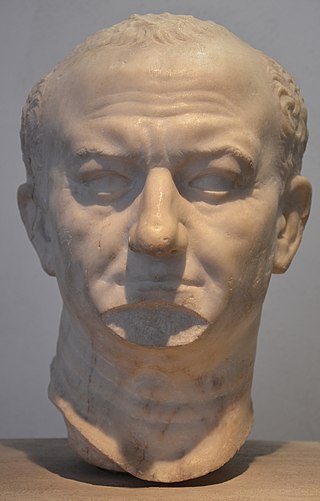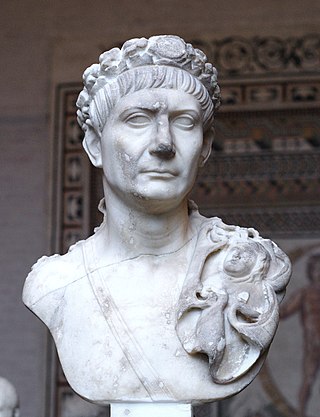
Domitian was Roman emperor from 81 to 96. The son of Vespasian and the younger brother of Titus, his two predecessors on the throne, he was the last member of the Flavian dynasty. Described as "a ruthless but efficient autocrat", his authoritarian style of ruling put him at sharp odds with the Senate, whose powers he drastically curtailed.

The gens Petronia was a plebeian family at ancient Rome. This gens claimed an ancient lineage, as a Petronius Sabinus is mentioned in the time of Lucius Tarquinius Superbus, the last of the Roman kings, but few Petronii are mentioned in the time of the Republic. They are frequently encountered under the Empire, holding numerous consulships, and eventually obtaining the Empire itself during the brief reign of Petronius Maximus in AD 455.

Pannonia Inferior, lit. Lower Pannonia, was a province of the Roman Empire. Its capital was Sirmium. It was one of the border provinces on the Danube. It was formed in the year 103 AD by Emperor Trajan who divided the former province of Pannonia into two parts: Pannonia Superior and Pannonia Inferior. The province included parts of present-day states of Hungary, Serbia, Croatia, and Bosnia and Herzegovina. The province was bordered to the east by a Sarmatian tribe—the Iazyges. Later, the Vandals appeared to the north-east.

The gens Flavia was a plebeian family at ancient Rome. Its members are first mentioned during the last three centuries of the Republic. The first of the Flavii to achieve prominence was Marcus Flavius, tribune of the plebs in 327 and 323 BC; however, no Flavius attained the consulship until Gaius Flavius Fimbria in 104 BC. The gens became illustrious during the first century AD, when the family of the Flavii Sabini claimed the imperial dignity.
Lucius Antonius Saturninus was a Roman senator and general during the reign of Vespasian and his sons. While governor of the province called Germania Superior, motivated by a personal grudge against Emperor Domitian, he led a rebellion known as the Revolt of Saturninus, involving the legions Legio XIV Gemina and Legio XXI Rapax, camped in Moguntiacum (Mainz).
Lucius Laberius Maximus was a governor of Roman Egypt in 83 CE, and prefect of the imperial bodyguard, known as the Praetorian Guard, during the reign of Roman Emperor Domitian, in 84 CE.
Titus Petronius Secundus was a prefect of the Roman imperial bodyguard, known as the Praetorian Guard, under emperor Domitian, from 94 until 96. Prior to becoming Praetorian prefect, Petronius had served as governor of Roman Egypt from 92 until 93.

The gens Vibia was a plebeian family at ancient Rome. Although individuals named Vibius appear in history during the time of the Second Punic War, no members of this gens are found at Rome until the final century of the Republic. The first of the Vibii to obtain the consulship was Gaius Vibius Pansa in 43 BC, and from then until imperial times the Vibii regularly filled the highest offices of the Roman state. The emperors Trebonianus Gallus and Volusianus each claimed descent from the family.

Nerva was Roman emperor from 96 to 98. Nerva became emperor when aged almost 66, after a lifetime of imperial service under Nero and the succeeding rulers of the Flavian dynasty. Under Nero, he was a member of the imperial entourage and played a vital part in exposing the Pisonian conspiracy of 65. Later, as a loyalist to the Flavians, he attained consulships in 71 and 90 during the reigns of Vespasian and Domitian, respectively. On 18 September 96, Domitian was assassinated in a palace conspiracy involving members of the Praetorian Guard and several of his freedmen. On the same day, Nerva was declared emperor by the Roman Senate. As the new ruler of the Roman Empire, he vowed to restore liberties which had been curtailed during the autocratic government of Domitian.

The gens Antonia was a Roman family of great antiquity, with both patrician and plebeian branches. The first of the gens to achieve prominence was Titus Antonius Merenda, one of the second group of Decemviri called, in 450 BC, to help draft what became the Law of the Twelve Tables. The most prominent member of the gens was Marcus Antonius.
The gens Appia was a plebeian family at Rome. Its nomen, Appius, is a patronymic surname based on the praenomen Appius. The gens does not appear to have been very large, and few of its members achieved great importance.
The gens Caecinia was a plebeian family of Etruscan origin at ancient Rome. Members of this gens are first mentioned in the time of Cicero, and they remained prominent through the first century of the Empire, before fading into obscurity in the time of the Flavian emperors. A family of this name rose to prominence once more at the beginning of the fifth century.

The gens Ulpia was a Roman family that rose to prominence during the first century AD. The gens is best known from the emperor Marcus Ulpius Trajanus, who reigned from AD 98 to 117. The Thirtieth Legion took its name, Ulpia, in his honor. The city of Serdica, modern day Sofia, was renamed as Ulpia Serdica.

The gens Norbana was a plebeian family at ancient Rome. Members of this gens are first mentioned toward the beginning of the first century BC, and from then to the end of the second century AD they filled a number of magistracies and other important posts, first in the late Republic, and subsequently under the emperors.
Aulus Bucius Lappius Maximus was a Roman senator who flourished during the Flavian dynasty; Brian W. Jones considers him one of Domitian's amici or advisors. He held the consulate twice.

The gens Sentia was a plebeian family at ancient Rome. Members of this gens are first mentioned in history toward the end of the Republic. The first of the Sentii to obtain the consulship was Gaius Sentius Saturninus, in 19 BC.
Servius Sulpicius Similis was an eques of ancient Rome who held several imperial positions, both civil and military, under Trajan and Hadrian, culminating with praefectus or governor of Egypt from 107 to 112.
Julius Basilianus was a Roman eques who held a series of imperial offices during later Severan dynasty. He was praefectus or governor of Roman Egypt in 218 before Macrinus appointed him praetorian prefect.